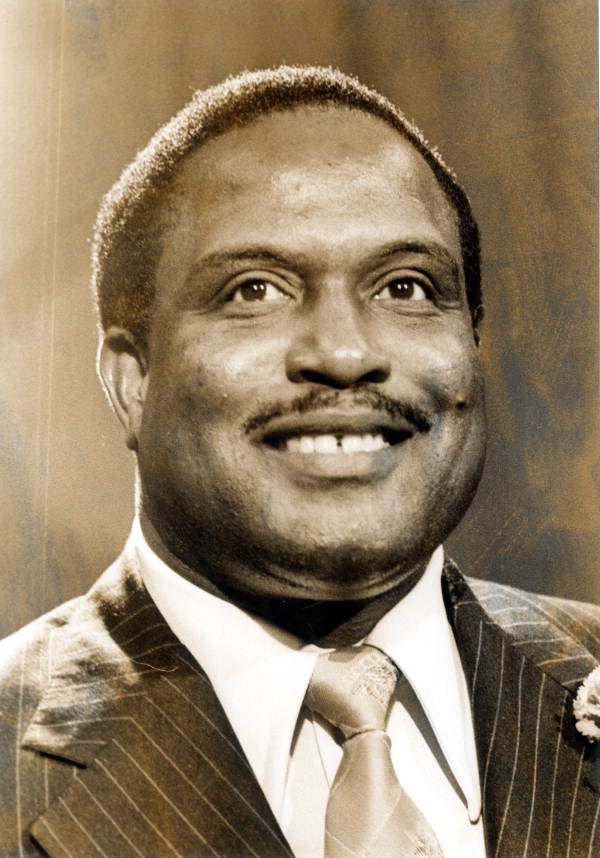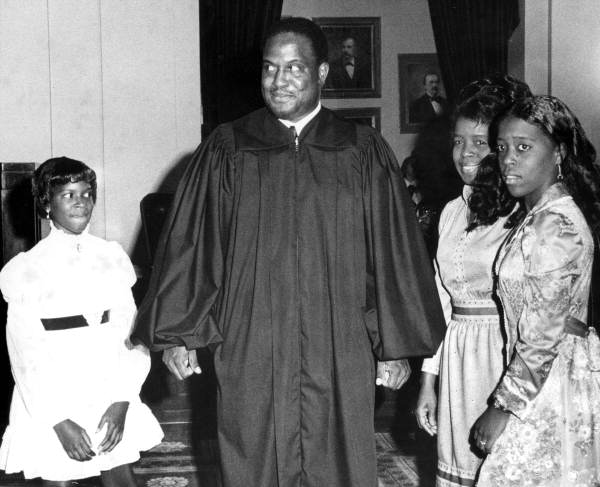Description of previous item
Description of next item
Joseph Woodrow Hatchett, 1932-2021
Published May 5, 2021 by Florida Memory
Joseph Woodrow Hatchett was a trailblazer in Florida’s judiciary. He was the first African American appointed to the state’s Supreme Court, as well as the first African American in the 20th century to win a contested election in Florida. Impressive as these accomplishments are, they represent only one phase of a distinguished legal career that spanned decades.
Justice Hatchett learned the value and importance of hard work at an early age. He was born in Clearwater in 1932 and attended segregated schools in Pinellas County. His father died when he was 8, leaving his mother, Lula, to care for young Joseph and three older brothers. Joseph had only been in school for a few years by that time, but he was already excelling, and he feared that without his father at home he might be called on to leave his studies and help support his family. “Mama,” he reportedly said, “if you let me stay in school, I’ll make you proud of me. I want to be a great man.”
Lula Hatchett made sure her youngest son stayed in school, and he delivered on his end of the deal as well. He continued to perform superbly in the classroom while finding odd jobs to help his mother make ends meet. As a teenager, he mowed lawns on Clearwater Beach, ran elevators in a downtown business building, and did laundry for a local church. At home, he washed and ironed his own clothes and learned to cook along with his brothers.
Joseph Hatchett’s strong work ethic and academic achievements won him admission to Florida A&M University in Tallahassee, where he graduated with a Bachelor of Arts degree in 1954. After his graduation, he was commissioned as a second lieutenant in the United States Army, and he served two years in Germany. His family expected him home in 1956, but Joseph announced he had other plans—he entered law school at Howard University. Lula later recalled that until that time, she had no idea her son had aspired to become an attorney.
Accomplishments piled up quickly for Hatchett after that. He graduated from Howard in 1959 and was admitted to the Florida Bar later that year. Most of Florida’s institutions and businesses were still segregated at the time, and although Hatchett was able to take the bar exam, he was not able to stay in the hotel where it was administered.
Hatchett’s early legal career was devoted to fighting exactly that kind of injustice. He entered private practice in Daytona Beach and practiced civil, criminal and civil rights law in both state and federal courts. At the same time, he served as an attorney for the NAACP Legal Defense Fund and as a consultant for the Daytona Beach Urban Renewal Department. In 1966, he was appointed assistant United States attorney for Florida’s Middle District and served in that capacity for five years before accepting the post of United States magistrate for the same district in 1971.
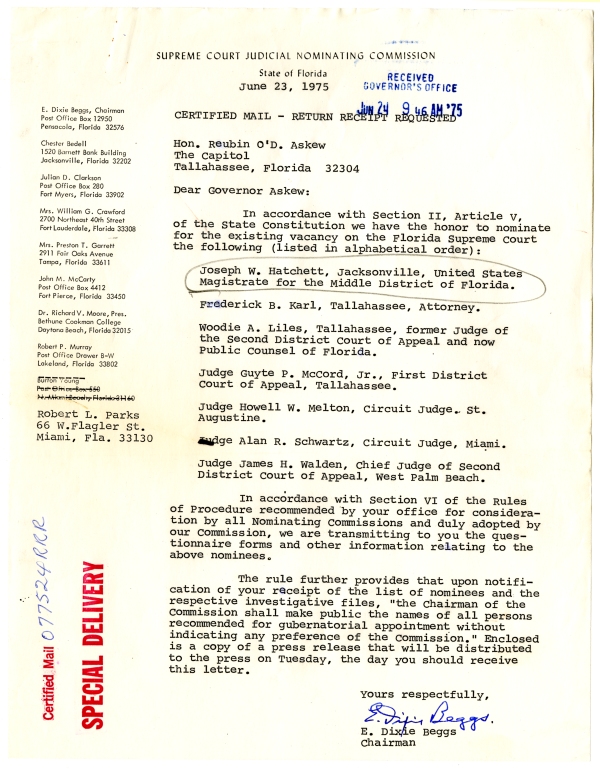
Letter from the Florida Supreme Court Judicial Nominating Commission to Governor Reubin Askew Listing Nominees for a Vacant Supreme Court Seat, June 23, 1975, in Box 10, Folder 22, Governor Askew Appointment and Resignation Files (Series S136), State Archives of Florida.
Judge Hatchett had a reputation for firmness and tenacity in the courtroom and a low profile in the outside world. When Governor Reubin Askew announced he was appointing Hatchett to a seat on the Florida Supreme Court, Askew admitted he had to do some serious background research to learn more about Hatchett—he had only met the candidate for the first time a few days beforehand, and Hatchett simply had not made a large body of public statements or appearances that the governor could draw from. The federal judges he spoke with, however, assured him that he was making a good appointment. Joseph Hatchett would make a fine justice.
Justice Hatchett served four years on the Florida Supreme Court, retaining his seat in a contested election in 1976. When several new federal judgeships were established by Congress in 1978, however, it was almost certain Hatchett would get one of them. The only question was whether it would be a district judgeship in Florida or a seat on the Fifth United States Circuit Court of Appeals. Hatchett applied to be considered for both the district and appellate judgeships, but in his public comments he made it clear he would particularly favor the appellate court job. In the end, that’s where President Jimmy Carter sent him by appointment in 1979, making Hatchett the first African American to serve on a federal circuit court in the Deep South.
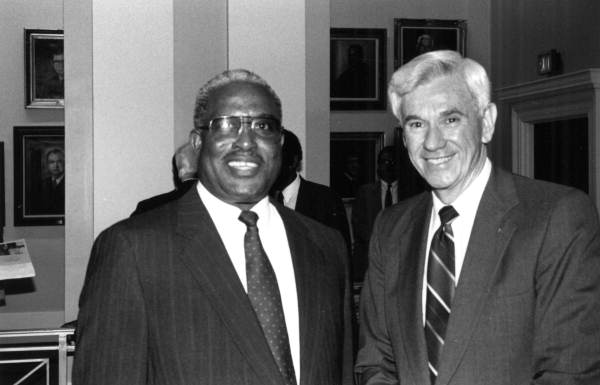
Federal Circuit Judge Hatchett (left) with former governor Reubin Askew (right) at a ceremony honoring Hatchett in 1990.
For the next 20 years, Hatchett served as a federal circuit judge, ending his tenure with a stint as Chief Judge of the 11th Circuit from 1996 to 1999. After retiring from the bench in 1999, he moved to Tallahassee and resumed private practice as an attorney.
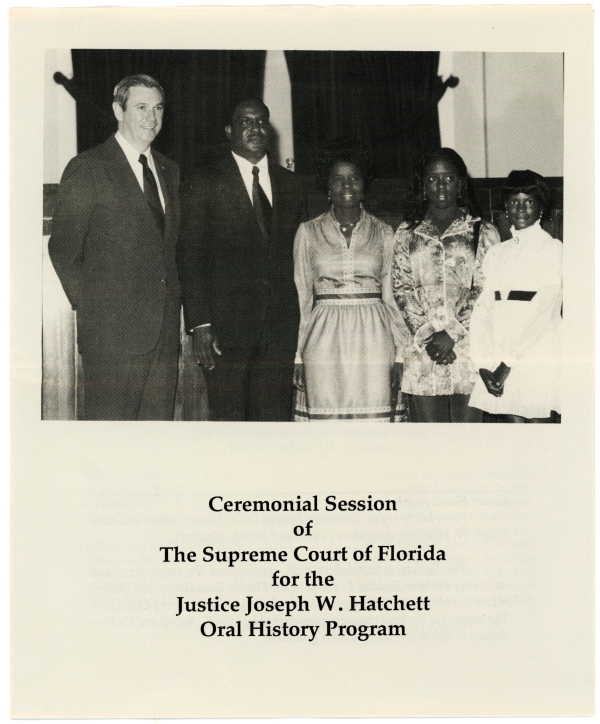
Program, Ceremonial Session of the Florida Supreme Court for the Justice Joseph W. Hatchett Oral History Program, May 2, 1990, in Box 6, Reubin Askew Photographs and Audio-Visual Materials, 1941-1999 (Collection N2000-9), State Archives of Florida.
Justice Hatchett died on April 30, 2021 at the age of 88, but his career and achievements remain an inspiration to Floridians, particularly those in the legal community who are especially aware of his extensive contributions to the cause of justice in our state and beyond.
Cite This Article
Chicago Manual of Style
(17th Edition)Florida Memory. "Joseph Woodrow Hatchett, 1932-2021." Floridiana, 2021. https://www.floridamemory.com/items/show/346218.
MLA
(9th Edition)Florida Memory. "Joseph Woodrow Hatchett, 1932-2021." Floridiana, 2021, https://www.floridamemory.com/items/show/346218. Accessed February 26, 2026.
APA
(7th Edition)Florida Memory. (2021, May 5). Joseph Woodrow Hatchett, 1932-2021. Floridiana. Retrieved from https://www.floridamemory.com/items/show/346218

 Listen: The Latin Program
Listen: The Latin Program